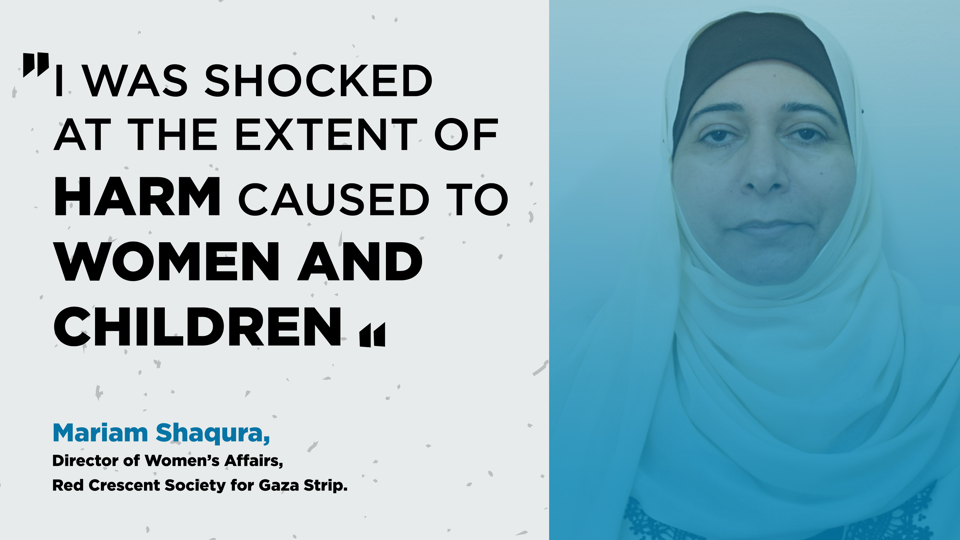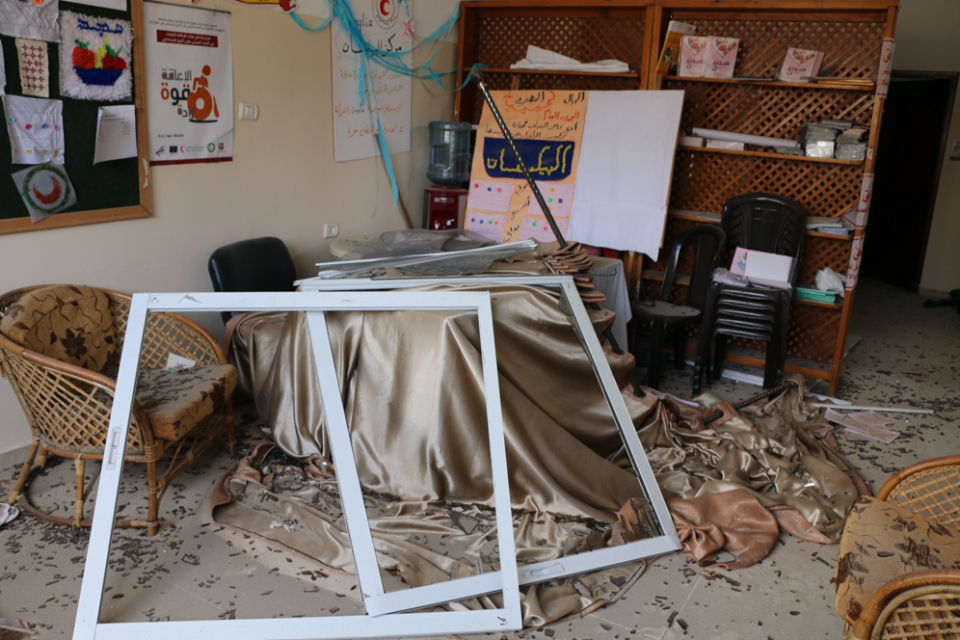From where I stand: Supporting refugee women amidst violence in Gaza
Date:

Mariam Shaqura, 46, is the Director of Women’s Affairs at the Red Crescent Society (RCS) in the Gaza Strip, where she has worked for 21 years. A mother of two girls, aged 13 and 8, Mrs. Shaqura talks about her experience during the recent escalation of violence on the Strip, and the damages caused to the Women’s Health Centre operated by RCS at the Jabalya Refugee Camp, one of the largest in Gaza.
Created in 1998, the Jabalya Women’s Health Centre is a partner of UN Women in Gaza under the project “Protection of Women and Girls Survivors or at Risk of Violence during COVID-19 in the Gaza Strip”, supported by the Government of Japan.
![]()
One night during the aggression, there was a missile attack directed at the area in front of the centre. At around 2.45 at dawn, there was heavy shelling that hit deep in the ground. It destroyed the street, internet cables, landlines, water and sanitation networks, affecting services and causing damage to the centre and its surrounding areas.
Almost all windows and doors were shattered. Everything made from glass or aluminium inside the place was damaged, including the solar panels, about 44 of them. The elevator was also damaged, the external gate, some computer screens, light bulbs, curtains, sports equipment, photocopy machines, the printer, the fax, many things.
However, the attack did not affect the strong will of our team and the local community. Hours after the missile hit, our workers and volunteers from the area started to clean up the place and prepare it for work by early Saturday, just a day after the ceasefire was announced. Municipalities also started clearing the street which was blocked by rubble and flooded with sewage.
On Saturday morning, we were back to work. We contacted beneficiaries over the phone to offer them psychological first aid and distributed psychological support packages to mothers to help them deal with the stress and trauma caused to their children after the attacks.
We had to stop most of our remote services because we had no internet connection. One of the neighbours donated a line for us so we can communicate with patients. They also donated water. At the refugee camp, people are helping each other and sharing whatever they can.

During the 11 days of the aggression, patients were unable to access our health services. Some women had urinary infections and others had pregnancy complications that could not be treated. Most of them were suffering post-traumatic stress disorder along with their children. I was shocked at the extent of harm caused to women and children.
People with disabilities are still unable to get through to the centre because of the damaged roads and rubble. Those who were receiving psychiatric help saw their conditions worsen. However, we continue to offer some services to people with disabilities through partner organizations. We provided them with devices and equipment they lost during the crisis, and we resorted to alternative ways of helping them by offering them counselling over the phone and WhatsApp groups.
Just a few weeks after the ceasefire, we are offering telephone counselling, first psychological aid, dignity kits to meet women’s basic needs as many left their homes without anything. We are also doing group therapy and we continue to provide pre-natal and post-partum services. We conduct in-person and online awareness sessions on war remnants safety which is a very crucial issue now. We also offered support to fifty men living in the centre’s vicinity who are suffering post-traumatic stress disorder. As we attempt to resume our regular services, there is a need for extra services as a result of the war and destruction.
Meanwhile, we are also trying to offer counselling to frontline responders. They need counselling and support to be able to go on and help others. As workers of the Red Crescent Society and as individuals, we were also severely affected by the situation, just as everybody else. Living in fear, being displaced or receiving displaced people. Many of us are also in need of water, electricity and internet connection.
Personally, I was hosting three displaced families at home. For two nights our area was targeted. Residents in the area were informed that whole buildings in our block, which is near to a petrol station, were going to be bombarded. This was a very scary experience. The first night, a warning of an imminent bombardment was spread online and by an international broadcaster. We evacuated the whole street. We stayed at other people’s homes until the morning. The second night we also heard that there might be an attack. It was really frightening. My two daughters and my husband are still suffering from that night’s trauma. It was difficult for all of us. Our fear and worrying about our children made us forget about ourselves.
We need to offer women more support, including health kits, medicines, psychological support and medical treatment. Many people who lost their homes have nothing now. They also need unconditional cash assistance, especially those who need to buy clothing and essential items for their children. Food coupons are not enough.
We have the right to enjoy peace, security and all the rights that other people around the world enjoy."